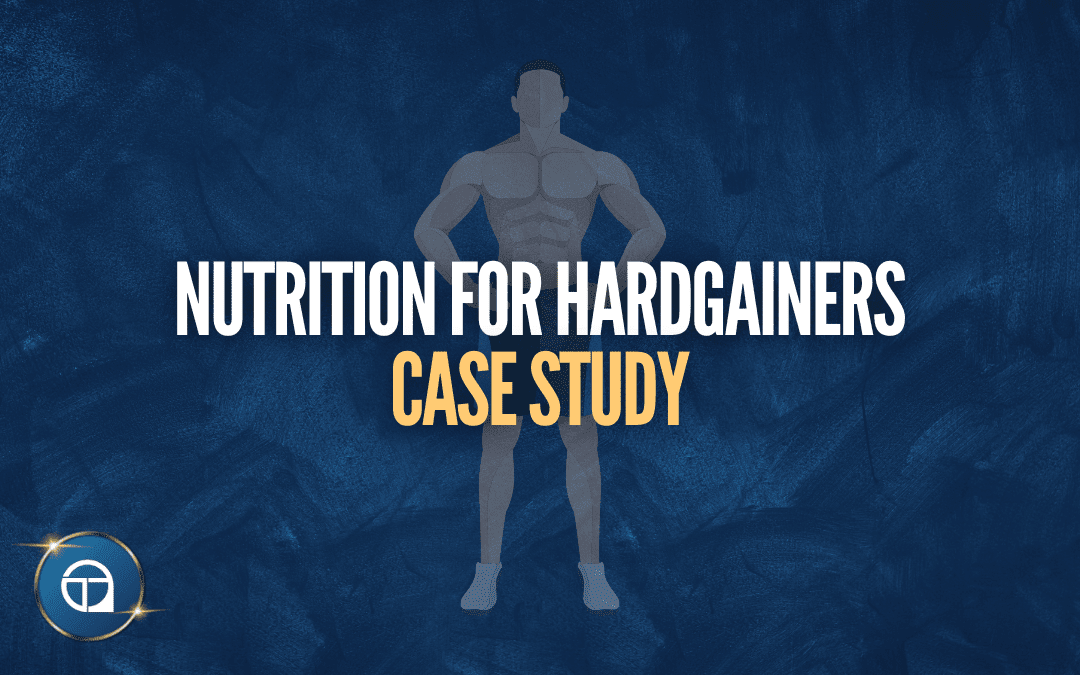Client case studies, such as this case study on nutrition for hardgainers, are a phenomenal way to learn how to coach someone. While we teach people how to coach nutrition and become certified Nutrition Coaches, there is just so much to learn and you often need examples to illustrate the concepts. Unfortunately, you can’t really find these online, and it leads coaches to make the same mistakes over and over, and it makes it difficult for coaches to know what to do. They end up feeling lost and unsure. Case studies also help the average person who may find that they have roughly the same characteristics and problems covered in the case study, and thus they get a peak into how coaching may help them solve their problems. As we are very interested in both helping the average person with their health and fitness (this is why we put out so much free content) and we want to improve the health and fitness industry by creating phenomenal coaches, providing free access to these case studies makes sense. So, with that out of the way, let’s get stuck in!
Nutrition for Hardgainers Case Study
Michael is a 28-year-old guy who loves training and has been lifting weights for a few years now. He is very dedicated to the gym, and he wants to build more muscle. However, Micheal has a “fast metabolism” and struggles to gain muscle, despite being very consistent with his training. He just can’t seem to add weight very effectively. He knows his training is dialled in, as he has spent a lot of time and effort ensuring that it is.
So Micheal came to me looking to get personalised nutrition coaching that was tailored for hardgainers. He needed an effective nutrition plan tailored to his needs, and most of all, he wanted to understand where he was going wrong with all his efforts!
To start, we did all the usual stuff we do when taking on a new client, and we had Micheal fill in his intake forms. We then dissected the data, and discussed things more in-depth with him. We then crafted a plan of action to tackle his issues.
Are hardgainers even real?
Now, before we get stuck into what we did to help Micheal, we have to discuss the topic of “hardgainers” and why some people struggle with building muscle. If you are a coach, you have to have some sort of understanding of this stuff to be able to accurately help someone, and if you are reading this because you are a hardgainer yourself, understanding the topic more is incredibly helpful too.
So are hardgainers real?
The short answer is yes. Some people simply don’t gain muscle as fast as other people, and this is likely due to some combination of genetics and upbringing. Some people just have better genetics for muscle building, and some people just developed a lot of the things that help with muscle building when they were younger (for example, if you grew up playing lots of sports, you likely have better neuromuscular coordination and mitochondrial density, which may make muscle building easier). There are many factors that go into determining both how much muscle you can ultimately build and how fast you can build it. So for some people, they just don’t have a phenomenal capacity for muscle building and they are always going to struggle with muscle gain.
Luckily, these aren’t the majority. The majority of hardgainers can actually solve their issue by getting their lifestyle habits sorted. And even if you did have terrible genetics for muscle building, you have no control over that, and you only have control over your habits. So for everyone, it is a waste of time to think about whether or not you have the best muscle-building genetics, and you would be better off focusing on ensuring your habits are absolutely dialled in for muscle-building.
For the vast majority of hardgainers, their issues are generally some or all of the following:
- Insufficient calorie intake.
- Poor meal structure and thus appetite.
- Poor appetite in general.
- High levels of general activity (generally high levels of non-exercise activity thermogenesis (NEAT) but also often high levels of exercise).
- Poor training technique, programming or ability to train hard.
Further to these, you often see people state that they are a hardgainer, when in reality they are just starting from a lower initial level. If you suddenly become conscious of your muscle mass levels at 20, when someone else your age has been playing sports their whole life and they have been training hard, building muscle, you naturally wouldn’t just decide that you are a hardgainer because you don’t have as much muscle mass as them. Well, that is what a lot of people actually do. They will say they are a hardgainer, when in reality, they are just a bit skinny and haven’t spent a significant amount of time building muscle. So they feel like they are behind where other people are, who started training at the same time as them, but those people just had more muscle to start with. Once they spend enough time training, they eventually catch up and they very often don’t actually struggle to build muscle, they just have more to build, thus it takes longer.
For most hardgainers, their issue is generally some form of excess energy expenditure and insufficient calorie intake. If you get your diet set up correctly, and you account for your energy expenditure, most people can gain muscle very nicely.
Client Intake and Assessment
Back to Micheal. After going through his intake forms and data, it was obvious that he had put a lot of work in on his training and diet. He was doing the vast majority of things right, and his training really was top-notch. He was putting in a lot of effort, but his nutrition was letting him down.
He was eating all the healthy foods that people generally think of when they think about healthy diets. However, this may actually have been to his detriment. You see, his diet quality was fantastic, and when discussing this with him, it was clear that he had done a lot of research on healthy diets. However, the unfortunate reality is that the vast majority of information on diets available online is actually geared towards weight loss. This makes sense given that most people are overweight or obese, so focusing on foods that leave you feeling fuller for longer and generally better nourished is going to be a priority for these populations. However, it meant that Micheal was almost always full, despite not actually eating a lot of calories.
What’s more is, he wasn’t tracking his calories either. He was relying on his feelings of hunger to dictate whether or not he should eat more or not. When simply tracked his dietary intake for a sample day, it was very obvious that he was not consuming enough calories. His overall diet pattern wasn’t bad, not by a long shot, however, he just wasn’t eating enough.
Tailored Nutrition For Hardgainers
With these issues identified, the path forward becomes quite clear. He had a number of issues, and we had the tools to overcome them.
Insufficient Caloric Intake:
It was clear that Micheal wasn’t consuming enough calories to support muscle building. It was no wonder he struggled to gain weight, he simply wasn’t eating enough.
To address this, we increased his calorie intake, and we helped him craft a nutrition plan around this so he could actually eat that amount of food.
Diet Structure:
Micheal was eating a lot of healthy food, but most of it was low-calorie, high-volume foods. So we helped him make better choices for his goals, that would allow him to actually eat the required calories. Rather than eating high-satiety potatoes, we switched that out for rice. We slightly reduced the amount of vegetables he was eating each day, and we also allowed for some more hyper-palatable foods to make their way into the diet.
We also worked on creating a very solid structure around his meals. He had guidelines for each major meal and his snacks. This meant that he was able to stay on top of his calorie intake, and he wouldn’t get to the end of the day and still have a mountain of calories to eat, but no appetite for them.
This all allowed Micheal to hit his calorie targets, without feeling excessively full.
Protein Intake:
It wasn’t only the calories that we worked on, we also had to increase Micheal’s protein intake too. He simply wasn’t eating enough. Now, the tricky thing with this, especially when trying to gain weight and struggling with appetite, is that protein is actually quite satiating and leads to feeling fuller for longer. So, we had to creep Micheal’s protein intake up to adequate levels, while monitoring his appetite. You can actually get away with lower protein intakes when gaining, but his intake still needed to be brought up.
Tracking Progress and Adjusting Over Time:
It is very easy to let subjectivity cloud the path forward with this stuff. We had to create very clear objectives for Micheal to see the progress he was making, so he knew he was on the right track. As Micheal’s goals were to gain more muscle, we generally relied a lot on tape measurements and body weight changes. If we didn’t see any of these markers changing favourably, then we would adjust the plan of action. Just because you solved a problem once, doesn’t mean that problem is solved forever. We knew we would have to adjust Micheal’s calories up a few times over the next few weeks and months, if we were to keep him moving in the right direction.
Hardgainer Case Study Conclusion
Generally, getting nutrition dialled in for hardgainers is actually simple enough. Once you know what to look for, and you come up with a plan to tackle the specific issues the client presents with, you can usually get really good results. In Micheal’s case, he went on to build a substantial amount of muscle, and after 6 months of coaching, he had gained more muscle than he had gained in the last 3 years.
The key takeaway for coaches is that you need to be able to identify the issues a client is facing, and then to also be able to create a plan of action to solve those issues.
If you are interested in learning how to coach nutrition, then we recommend getting certified as a nutrition coach. If you aren’t a coach but want to learn more about nutrition, we recommend reading about how to set up a diet. Nutrition is only one piece of the puzzle though, so reading up on how to get good sleep hygiene and stress management practices in place, would also be of benefit. Finally, if you are looking to get help with your diet specifically, then online nutrition coaching may be for you. We also have a number of episodes of the podcast that may be of interest to both coaches and individuals who want to learn more about all of this health and fitness stuff.
Nutrition For Hardgainers FAQs
I know reading case studies can still leave you with some questions, and as I want to try and ensure you are actually able to help your clients in future, it is important to try and get all your questions answered here. If you coach this population, you will likely get a lot of these types of questions, so this will hopefully be helpful for you!
How can hardgainers determine their caloric needs for effective weight gain?
The same way everyone else does. You can either use a calorie calculator to estimate them for you, or you can simply track your calories for a few days (or weeks) and see how your body weight changes as a result. If you are unsure of how to do this, then you can read up more in this article about how to set up a diet.
What are the essential macronutrients hardgainers should focus on in their diet?
There really is no difference in what a hardgainer should focus on and what anyone else should focus on. Calories are most important, then protein, and then carbs and fats are pretty equal (although carbs probably have the edge, as they are generally going to be more bang for your buck when trying to gain weight).
Are there specific foods that are beneficial for hardgainers’ muscle growth?
While I would love to tell you that some exotic food is going to allow you to gain copious amounts of muscle, but this just isn’t the case. You just need to eat sufficient calories, and do that for months, and you will build muscle.
Should hardgainers consider supplements, and if so, which ones are most effective?
There are no specific supplements that hardgainers need to focus on. There are some supplements that can be helpful, like a protein powder and maybe even a weight gain powder (generally just a protein and carbs powder), and the general supplements we recommend. But there are no secret supplements that will help you build muscle more effectively, and if there were, everyone would just be using them.
How can hardgainers improve their appetite?
This is actually a difficult problem to solve. However, generally, it can be tackled in two ways. The first is to actually create a better diet structure. A lot of people complain of poor appetite when in reality, they are actually just trying to eat a lot of food very close together. You frequently see this in college students who struggle to gain weight. They sleep in until midday and then have like 200 calories for breakfast, and then try to get 3000 calories in for dinner. This isn’t low appetite, it is just a poorly set up diet. The second way poor appetite can be dealt with is by eating more hyper-palatable foods. If you predominantly eat lots of high-satiety, low-calorie foods, well, you are always going to feel fuller. So switching out some of these foods for more high-calorie density foods will allow you to improve your appetite.
Why do hardgainers have such fast metabolisms?
This is actually not true. Generally, it is heavier individuals who have faster metabolisms. Your metabolic rate is predominantly determined by your weight, especially your lean mass levels. So if you are naturally skinnier and don’t weigh much, you likely have a reduced metabolism.
However, the reason hardgainers generally don’t gain weight as quickly is because they don’t eat enough and/or they simply burn a lot of calories either through their daily activity (NEAT) and/or their exercise patterns.
Is there a specific meal timing strategy that benefits hardgainers’ muscle-building efforts?
There is no specific meal timing strategy that is going to lead to more muscle being built, other than following the generally good diet guidelines. Your focus should be on developing a good diet structure that allows you to consistently eat enough, and to eat enough protein, spread out across the day.

Paddy Farrell
Hey, I'm Paddy!
I am a coach who loves to help people master their health and fitness. I am a personal trainer, strength and conditioning coach, and I have a degree in Biochemistry and Biomolecular Science. I have been coaching people for over 10 years now.
When I grew up, you couldn't find great health and fitness information, and you still can't really. So my content aims to solve that!
I enjoy training in the gym, doing martial arts and hiking in the mountains (around Europe, mainly). I am also an avid reader of history, politics and science. When I am not in the mountains, exercising or reading, you will likely find me in a museum.


